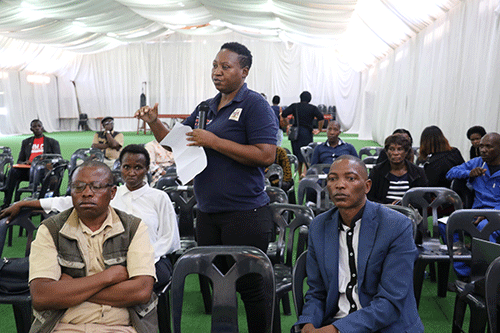Noreen Sitali
The Parliamentary Standing Committee on Human Resources and Community Development commenced its regional Public Hearings on the motion of youth unemployment on 29 May in the Zambezi region.
The committee is conducting regional consultations with young people and relevant stakeholders on the tabled motion.
The public hearings on youth unemployment come after member of parliament Inna Hengari tabled the motion in parliament on youth unemployment on 26 October 2022, and requested that it be referred to a relevant standing committee (human sesources) for further deliberations, nationwide consultations with young people and relevant stakeholders.
The Ministry of Higher Education, Technology and Innovation (MHETI) in 2018 reported over 67 000 unemployed graduates in the country.
Hengari argued that the mismatch between the educational structure and the needs of the labour markets is one of the leading causes of unemployment amongst educated Namibians, a sentiment shared by the majority of the youth during the hearing in Zambezi during the committee’s public hearing in the region
“Government must create targeted intervention policies, aimed at promoting youth unemployment and youth employment creation, similarly to Affirmative Action, be it supported grogrammes,” said a concerned youth Kabende Kabende.
Grace Siambango, another concerned youth from the region, lamented that recruitment criteria revisited, especially at the entry-level, where experience is required.
“Opportunities should be given to those who graduate first in order to reduce the number of shortlisting,” stressed Siambango.
Zambezi governor Lawrence Sampofi alluded that youth unemployment is not only a regional course for concern but a nationwide issue that will require collective efforts.
“Human resources are the backbone of a country’s development; stakeholders need to come together and discuss this issue of unemployment – let us combine forces to solve this problem,” stressed Sampofu during the committee’s courtesy call on him and the regional councillors.
The Namibia Labour Force Survey conducted by the Namibia Statistics Agency in 2018 found that there were 876 908 youth, aged 15 to 34 in Namibia, of which 310 854 (35.4%) were employed and 265 770 (30.3%) were unemployed.
In her motion, Hengari argued that policy implementation shortfalls, lack of investments in youth-run SMEs, a skewed education system, corruption and its systematic nature have led to high youth unemployment.
Meanwhile, in the Kavango East region, some education stakeholders suggested that nurturing of entrepreneurship at educational level would instil young people with mindsets of employment creation, instead of employment seekers, which is the current situation.
Another unemployed youth, Dante de Almeida, stressed that there’s a significant need to break the ‘No experience, no employment’ criteria, which the majority agrees limits the youth into entering the labour market.
A representative from a youth institution suggested it is high time the national budget starts catering to the plight of the youth, stressing that the budget does not ultimately address the needs of the youth, especially in the areas of business funding and skills development.
He said, the government should consider investing in existing and non-existing industrial sectors in the region that could see the youth entering the labour market.
“There’s no industrialisation in the country at large that could help the youth venture into manufacturing,” noted a young unemployed youth from the region.
Youth in Kavango East called on the government to prioritise regional investment to curb rural migration and meet rural employment creation.
Unemployed teachers in the region are calling on the government to build more schools to create employment.
The committee consists of Annakletha Sikerete, Johana Kandjimi, Maximalliant Katjimune, Yvette Aaraes, Gothard Kandume, Nono Katjingisua (the chairperson) and Kathleen-Joyce Nakutta (director of committee services).
* Noreen Sitali is an information officer in the National Assembly Directorate of Information and Research



